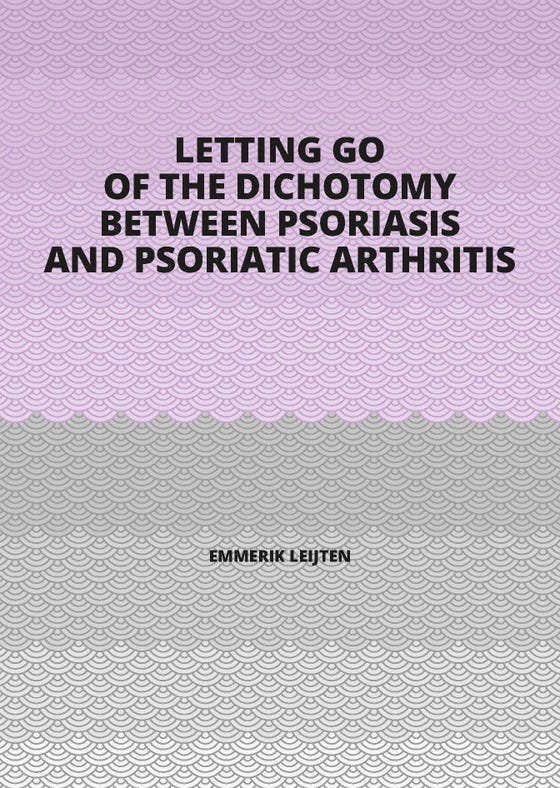Jun 28: Psoriasis and psoriatic arthritis fall within a spectrum of one single disease

Psoriasis and psoriatic arthritis (PsA) have a predominantly shared genetic background and overlapping immunologic and proteomic signature. This confirms their denomination as falling within a spectrum of one single disease, as was concluded by Emmerik Leijten in his PhD thesis that he will defend on June 29 at Utrecht university.
Psoriasis is a common autoimmune disease associated with scaly, red, itchy patches of skin. About 20 percent of patients with psoriasis also develop a rheumatic disease called psoriatic arthritis (PsA). However, the relationship between skin and joint manifestations encompasses a spectrum: patients can have severe psoriasis without musculoskeletal symptoms, while others have minimal psoriasis and severe arthritis. Although PsA has a clear adverse effect on quality of life, much is still unknown about the disease.
The PhD thesis by Emmerik Leijten (Department of Rheumatology & Clinical Immunology and Center for Translational Immunology, UMC Utrecht) describes his search to further unravel the biological mechanisms behind psoriasis and PsA, how healthcare professionals and patients can better recognize PsA, and what they can expect from treatment.
One single disease
The main finding by Leijten and colleagues was that psoriasis and PsA have a predominantly shared genetic background and overlapping immunologic and proteomic signatures. This confirms their denomination as falling within a spectrum of one single disease. It is thought that local tissue factors induce a primary inflammatory response, followed by a persistent inflammatory environment that hosts innate and adaptive immune cells with overlapping functional effects. The local inflammatory process of the tissue is capable of determining the phenotype of where psoriasis and/or arthritis can occur in an independent fashion both from clinical and pathophysiological point of view. In the circulating compartment, Leijten and colleagues detected only subtle differences between patients with psoriasis compared to PsA, indicating that if cross-tissue contamination occurs, this is a chronic and subtle process not readily detectible by cross-sectional screening.
Screening questionnaires
The results from the clinical work presented in this thesis indicate that screening questionnaires for PsA should be implemented in care for psoriasis patients attending dermatology clinics. As far as treatment is concerned, the results indicate that major phenotypic manifestation should drive the choice of therapy, with methotrexate as preferred option over sulfasalazine for treating arthritis. Main phenotypic manifestations should drive study participant selection for both clinical and basic research questions, without the need to dichotomize PsA versus psoriasis.
Future studies
Emmerik Leijten proposes that future research into the immune cells will have to focus on taking samples from both skin and joints. It should examine if the inflammatory response at the primary tissue site is capable of priming distant tissue sites for a secondary inflammatory response, in order to better understand and better treat PsA.
He also discusses how drug research can be approached differently so that the results of such studies better match daily practice and remain in the service of the patient. In view of the vastly increasing number of therapy choices, Leijten proposes to select one drug as a ‘gold standard’ for clinical research for PsA and that all new drug candidates should be compared to this gold standard. Finally, to further unravel the complex drug-effect relationships, it is important that future researchers should have easy access to the raw data of previous studies.
PhD defense
Emmerik Leijten, MD (1984, Miami FL, USA) will defend his PhD thesis on June 29, 2021 at Utrecht University. The title of his thesis is “Letting go of the dichotomy between psoriasis and psoriatic arthritis”. A live stream will be available from 16.15-17.00 hrs CEST via https://emmerik.carrd.co/. Supervisors are prof. dr. Timothy Radstake (Department of Rheumatology & Clinical Immunology and Center for Translational Immunology, UMC Utrecht) and dr. Marianne Boes (Center for Translational Immunology, UMC Utrecht). Emmerik Leijten will finish his training to become a rheumatologist in the summer of 2021.

